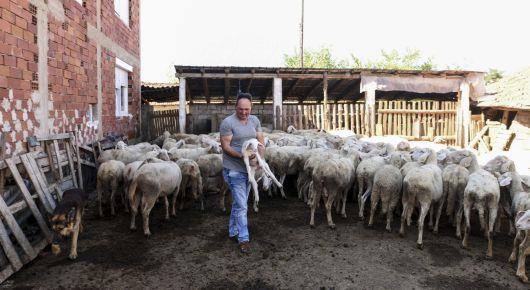FAO: Family farms are key to sustainable future in Europe and Central Asia

There are an estimated 500 million family farms in the world, representing more than 90 percent of all farms. They are essential to our way of life, producing the bulk of our food and serving as the foundation of agriculture and the rural economy. Family farmers hold the key to a more sustainable future.
Building on the achievements of the International Year of Family Farming 2014, the United Nations declared 2019–2028 to be the Decade of Family Farming. A high-level conference taking place today in Bucharest, Romania, which currently holds the Presidency of the Council of the European Union, contributes to the European dialogue on family farming.
FAO led the first panel discussion at the conference, looking into the role of family farms in sustainable development. The session elaborated on the contribution of smallholders in achieving the 2030 Agenda for Sustainable Development and the Sustainable Development Goals, and it explained the overall situation of family farms in Europe and Central Asia. Serbia, which is in the anteroom of European Union accession, was presented as an example.
“The Year of Family Farming improved the collective understanding of the challenges family farmers face, and it created political will and partnerships to address them,” said Morten Hartvigsen, delivery manager of FAO’s Regional Initiative on smallholders and family farms. “Both the Year and the Decade of Family Farming provide great impetus to our work.”
Support to smallholders and family farms is one of the four regional priorities of FAO in Europe and Central Asia, where FAO aims to improve policy development, sustainable agricultural production and rural livelihoods while reducing rural poverty. To this end, FAO assessed the needs and constraints of smallholders and family farms in seven countries (Albania, Armenia, Georgia, Kyrgyzstan, Republic of Moldova, North Macedonia and Tajikistan). The country studies will be published in April.
As Hartvigsen pointed out in his presentation, the rural economy should be diversified in these countries to provide both on- and off-farm employment.
“Rural areas would benefit from better conditions in general, including social protection, employment opportunities, investments, economic indicators, and trade linkages,” Hartvigsen said. “Smallholders need training to be able to shift to more environmentally friendly methods, such as agroecology and organic farming. And female farmers shouldn’t be left out here, either.”
Often, land fragmentation hampers development of the rural economy. It is a common problem of many countries in Europe. Small and scattered agricultural plots should be addressed through integrated efforts at land consolidation while ensuring access to land for smallholders.
FAO promotes integrated community development, a participatory and inclusive approach with tailor-made support to small farms through grant schemes or support measures based on the specific needs and priorities of each community.
Despite their fundamental role, both small farms and rural communities are in decline across rural Serbia, due to aging populations, youth outmigration, declining economic growth, and the ecological and social situation.
Natalija Bogdanov, a professor at the University of Belgrade, spoke during the FAO session and mentioned some tools that would help address these challenging issues, such as better policy coordination across governmental bodies and levels of policymaking, social protection, and investments into rural infrastructure, including land consolidation, improvement of soil quality, and one-off support schemes for new farmers.
“It is important to improve understanding of the overall livelihood strategies of smallholders and family farms to better ‘characterize’ the beneficiaries of both social and agricultural policies,” Bogdanov emphasized.
The UN Decade of Family Farming will be officially launched on 27–29 May at FAO’s headquarters in Rome.
12 March 2019, Bucharest, Romania
